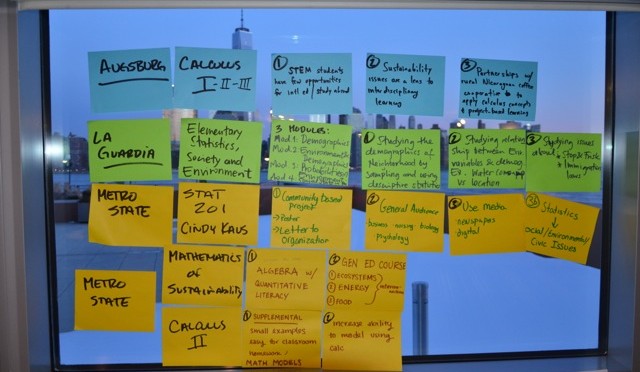Engaging Mathematics: Building a National Community of Practice is the name for a new three-year initiative supported by the National Science Foundation though its TUES-II program.
Engaging Mathematics (EM) will be organized by faculty colleagues who have successfully incorporated the SENCER ideals and other progressive pedagogies into college-level mathematics education. Over the next three years, the partners will work together to develop, assess and refine courses and modules, sharing them within the community of practice. As the project matures, EM partners will disseminate the results of their labors to the larger higher education community through a variety of media. While EM partners will routinely communicate with the SENCER community and participate in SENCER’s faculty development programs, they will also reach out to—and through—disciplinary societies and others new to SENCER.
In three years, the EM project intends to produce and publish transferable models, offer webinars, and organize local, regional, and national faculty development opportunities. The overall goal is to nurture and support a vibrant community of practice open to those committed to improving mathematics learning by connecting that learning to the great civic challenges of our day.
“Though this wasn’t so in the early years of SENCER, we now have a strong corps of leaders, along with terrific models and other curricular assets, in mathematics,” noted David Burns, NCSCE’s executive director and the PI of the new NSF award. “This grant from NSF will enable a team of scholars who have created many of these assets to work intensively with one another to expand their efforts, connect to new communities, and introduce successful approaches to colleagues around the country.”
“As with all our Center’s initiatives, our goal is to improve learning and strengthen the capacity for responsible civic engagement, ” Burns added. “We are blessed with a terrific team of co-PI’s and campus collaborators who will work to achieve the ambitious goals we set for this project. This is especially important work in the context of our nation’s need to improve our capacity to use mathematics to describe, model, analyze, and make reliable predictions about some of the most vexing problems we face. How to best understand and make decisions about a welter of personal and practical problems that are presented and argued in mathematical or statistical terms is one more challenge we hope to help our students meet.”
Burns, who will serve as principal investigator of Engaging Mathematics, will be joined by a team of co-principal investigators including: Dr. Cindy Kaus of Metropolitan State University, Dr. Mangala Kothari of LaGuardia Community College, and Dr. Frank Wattenberg of the United States Military Academy.
Engaging Mathematics institutional partners include Dr. John Zobitz of Augsburg College, Dr. Victor Padron and Dr. Tony Dunlop of Normandale Community College, Dr. John Nardo and Dr. Lynn Gieger of Oglethorpe University, and Dr. Barbara Gonzalez and Dr. Cathy Evins of Roosevelt University. Dr. Leo Gafney will provide guidance and overall evaluation of Engaging Mathematics activities.
During the term of the project, partners at LaGuardia Community College plan to expand on the successful Project Quantum Leap course Elementary Statistics with Environmental and Social Issues. Metropolitan State University participants will create modules for calculus courses centered on the topic of sustainability. In addition to these newly developed courses, LaGCC and Metro State will also disseminate successful SENCER applications on their campuses to the other Engaging Mathematics partners, and to faculty and administrators locally and nationally.
Augsburg’s focus will be on a project-based calculus endeavor, while Oglethorpe University will create new models for the general education courses required of all students. Roosevelt University partners plan to integrate the SENCER approach into a college algebra course using issues affecting the city of Chicago. Normandale Community College plans to focus on water issues in a general education course, specifically enabling students to create linear and regression models. They also plan to introduce calculus-based group projects into another course.
An overall project goal is to have the newly developed course and modules taught at both the institution where the course was originally developed and at a partner campus. In the end, all the institutional partners will thus have the benefits of several new courses and the PIs and project team will have a better understanding of what is needed to make courses succeed in multiple settings.
Professor Frank Wattenberg of the United States Military Academy will provide guidance and forge connections with other national mathematics innovation initiatives. He will be responsible for connecting our reform efforts to already successful and complementary projects, so that the full advantage of what has been developed and learned by others is available to the EM partners and the SENCER community.
Distinguished educators who will advise Engaging Mathematics partners as they execute activities over the next several years include David C. Arney of the United States Military Academy, Samuel Benigni of Harrisburg University of Science and Technology, Prabha Betne of LaGuardia Community College, Victor Donnay of Bryn Mawr College, David Ferguson of Stony Brook University, Susan Forman of CUNY Bronx Community College, and Solomon Garfunkel of COMAP. Additionally, NCSCE senior scholars Ellen Mappen and Eliza Reilly will assist project partners with consultation on planning and dissemination and in transforming their successful courses and modules into SENCER national models.
At its invitation, the Engaging Mathematics leadership team will work with the Mathematical Association of America to disseminate materials, modules/courses, and results to their communities of interest. Additionally, Engaging Mathematics will offer a website where updates and resources developed throughout the initiative will be made available to all interested educators, administrators, and students. Regional meetings, national symposia presentations, and faculty development programs are planned.
Look for reports on the work of the Engaging Mathematics partnerships, along with information on how you and your institution might benefit from the EM project in future editions of the eNews.
Article originally published September 19, 2013.


